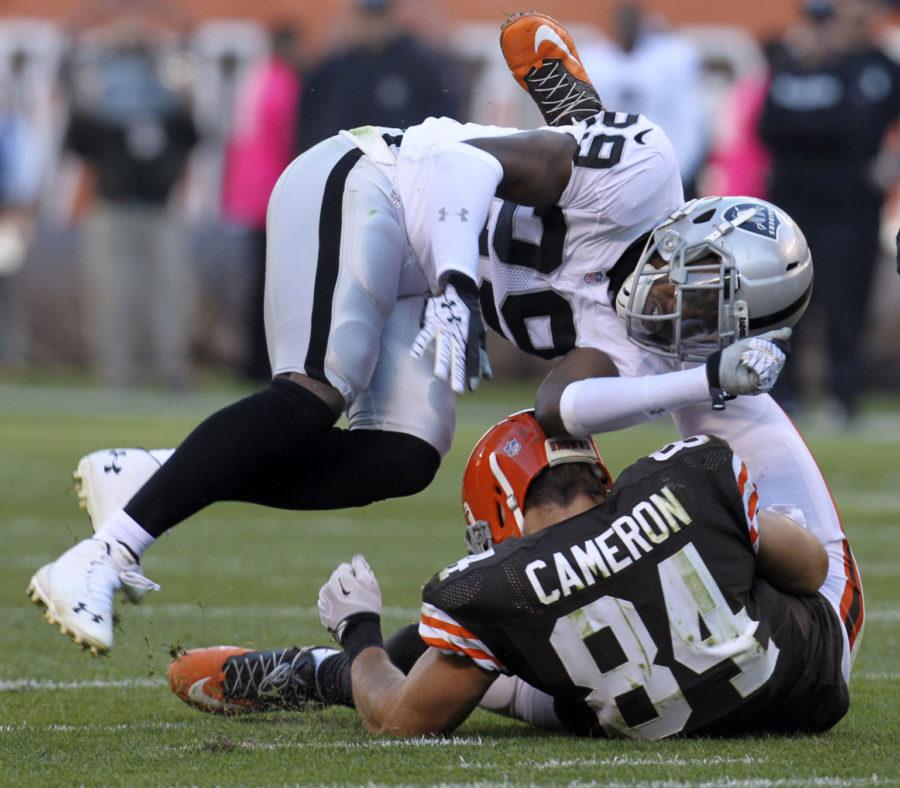Forgetting things: concussions and the NFL
November 11, 2014
Bad things are always swept under the rug.
I believe humans are inherently positive. Optimism tugs at the heart of every person, especially in sports. That’s why anyone involved with sports loves underdogs, comeback kids and redemption stories.
But does that positivity mean we lose sight of important things?
The NFL season is in full swing and both fans and media alike are wrapped up in all the on-field storylines this season has produced. Are the Patriots for real? Is Peyton Manning the greatest ever? Are the Bears really that bad?
But, we’ve all been duped by our own positivity; we forgot what really matters.
Get The Daily Illini in your inbox!
The NFL is destroying people’s brains, and we’ve forgotten about that.
Sounds dramatic, right?
In August 2013, a settlement worth nearly $800 million was reached between the NFL and thousands of former players who claimed to suffer from football-induced head injuries.
That settlement was modified in July of this year in an effort to remove a cap on the damages that may be paid to current and former players. Both happened during the offseason and garnered significant attention. For context, $800 million could buy any one of several different professional sports franchises.
I’m not a doctor. I don’t know the exact specifics of dementia, Alzheimer’s or chronic traumatic encephalopathy (commonly known as CTE).
But I have had a concussion.
I was concussed during my senior season of high school football during a game against our biggest rival. I don’t know on which play I was concussed, but that’s not because I blacked out or lost vision; in fact, I suspect it was on a play during which I wasn’t even knocked to the ground.
My head hurt after the Friday night game, but if you play football, your head usually hurts after a game; you just pop two ibuprofen tablets and expect to feel better in the morning.
The next Monday morning I was diagnosed with a mild concussion by the school’s athletic trainer. My head hurt for the next three weeks, but after being concussed on Oct. 19, I returned to play in my final football game ever just a month later.
I only played serious varsity football for two years. I wasn’t a lineman or a linebacker or a running back. I was a wide receiver who caught just a single pass my entire high school career. I made twenty or thirty tackles on defense at corner and safety and never really got “hurt” on any big hits.
But what about practices? What about those hundreds of hits I absorbed during Oklahoma drills, blocking drills or during full-team scrimmages?
I loved playing football, and if I had to choose, I’d do it all again in a heartbeat.
Did you really care all that much about my high school football career?
You probably didn’t, but it’s the best example I have of how many hits a football player takes simply in a career that extends until the age of 17. Double that and you’re looking at the age of current Bears’ linebacker Lance Briggs, who turns 34 on Wednesday. How many hits has he taken? How many concussions has he suffered?
We’ve forgotten about concussions. It seems to just be a hot topic during the offseason, but it needs to be a topic now.
Carson Palmer tore his ACL on Sunday, and on the NFL’s Week 10 injury report, there were 84 players with knee-related injuries, compared to 22 players listed with head injuries. But don’t think for one moment that head injuries aren’t the most common injury in the NFL right now, because they are.
Honestly, I don’t know how the NFL can address brain injuries. I’m not an expert, but I do know that the NFL should be held accountable and not just financially accountable. On the issue of concussions, as well as on a host of other things, including domestic violence, I know the NFL needs to be held accountable.
It needs to be held morally accountable.
Peter is a sophomore in Media. He can be reached at baileyw2@dailyillini.com and on Twitter @pbaileywells22.







